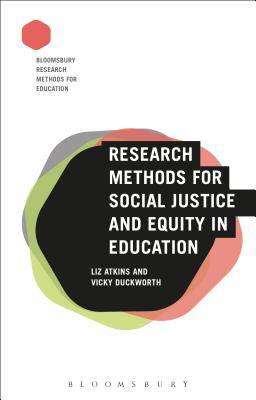
Bedankt voor het vertrouwen het afgelopen jaar! Om jou te bedanken bieden we GRATIS verzending (in België) aan op alles gedurende de hele maand januari.
- Afhalen na 1 uur in een winkel met voorraad
- In januari gratis thuislevering in België
- Ruim aanbod met 7 miljoen producten
Bedankt voor het vertrouwen het afgelopen jaar! Om jou te bedanken bieden we GRATIS verzending (in België) aan op alles gedurende de hele maand januari.
- Afhalen na 1 uur in een winkel met voorraad
- In januari gratis thuislevering in België
- Ruim aanbod met 7 miljoen producten
Zoeken
€ 220,45
+ 440 punten
Uitvoering
Omschrijving
Research Methods for Social Justice and Equity in Education offers researchers a full understanding of very important concepts, showing how they can be used a means to develop practical strategies for undertaking research that makes a difference to the lives of marginalised and disadvantaged learners. It explores different conceptualisations of social justice and equity, and leads the reader through a discussion of what their implications are for undertaking educational research that is both moral and ethical and how it can be enacted in the context of their chosen research method and a variety of others, both well-known and more innovative.
The authors draw on real, practical examples from a range of educational contexts, including early childhood, special and inclusive education and adult education, and cultures located in both western and developing nations in order to exemplify how researchers can use methods which contribute to the creation of more equitable education systems. In this way, the authors provide a global perspective of the contrasting and creative ways in which researchers reflect on and integrate principles of social justice in their methods and their methodological decision making.
It encourages the reader to think critically about their own research by asking key questions, such as: what contribution can research for equity and social justice make to new and emerging methods and methodologies? And how can researchers implement socially just research methods from a position of power? This book concludes by proposing a range of methods and methodologies which researchers can use to challenge inequality and work towards social justice, offering a springboard from which they can further their own studies.
The authors draw on real, practical examples from a range of educational contexts, including early childhood, special and inclusive education and adult education, and cultures located in both western and developing nations in order to exemplify how researchers can use methods which contribute to the creation of more equitable education systems. In this way, the authors provide a global perspective of the contrasting and creative ways in which researchers reflect on and integrate principles of social justice in their methods and their methodological decision making.
It encourages the reader to think critically about their own research by asking key questions, such as: what contribution can research for equity and social justice make to new and emerging methods and methodologies? And how can researchers implement socially just research methods from a position of power? This book concludes by proposing a range of methods and methodologies which researchers can use to challenge inequality and work towards social justice, offering a springboard from which they can further their own studies.
Specificaties
Betrokkenen
- Auteur(s):
- Uitgeverij:
Inhoud
- Aantal bladzijden:
- 352
- Taal:
- Engels
- Reeks:
Eigenschappen
- Productcode (EAN):
- 9781350015456
- Verschijningsdatum:
- 21/02/2019
- Uitvoering:
- Hardcover
- Formaat:
- Genaaid
- Afmetingen:
- 140 mm x 216 mm
- Gewicht:
- 553 g

Alleen bij Standaard Boekhandel
+ 440 punten op je klantenkaart van Standaard Boekhandel
Beoordelingen
We publiceren alleen reviews die voldoen aan de voorwaarden voor reviews. Bekijk onze voorwaarden voor reviews.









